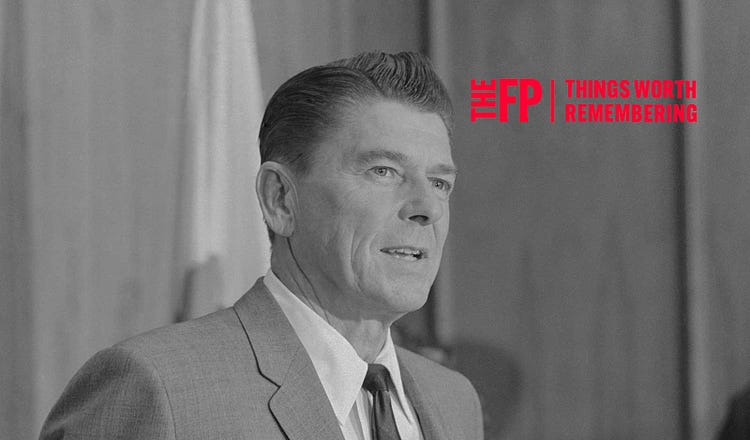
Welcome to Douglas Murray’s column, “Things Worth Remembering,” in which he presents great speeches that we should commit to heart. Scroll down to listen to Douglas reflect on Ronald Reagan’s timeless speech, “A Time for Choosing.”
And if you’ve got a minute, click here to complete a quick survey so we can learn more about you and what you’re craving from The Free Press. Help us make our work (even) better. Plus: everyone who completes the survey will be entered in a raffle to win Free Press swag!
Among my legion of disdains is a particular contempt for people who inherit their politics. Nothing makes the heart sink more than somebody who explains their view by saying, “My family has always voted Democrat,” or “I come from a long line of Republicans.” So what? I always twitch. How about thinking for yourself?
Among those I most respect, however, are people who are willing to change their minds—and admit to doing so. People who break away from not only their parents’ politics but also their own past convictions. We should remind ourselves of such people during election season, a time when attitudes harden and calcify.
Among America’s best-known political apostates is Ronald Reagan. Having grown up with a fervent Democrat for a father, he moved to California to pursue acting with similar politics. Later in life, he would describe his younger self as a “near-hopeless hemophilic liberal,” so passionately had he “bled for ‘causes.’ ”
In Hollywood, he could not help but notice that his tribe no longer shared his views. “I didn’t leave the Democratic Party,” he remarked in 1962. “The party left me.” Two years later, he explained why he had come to believe in the Republican project, in one of the greatest examples of political oratory in America’s modern history.
I have been meaning to write about “A Time for Choosing,” ever since I devoted a column to Barry Goldwater’s failure at the Republican National Convention of 1964. For it was at that very same convention that Reagan launched his political career.
And it was in the months that followed that he worked on “The Speech,” as he called it, giving versions of it in many different forums across the country, honing it, adding to it, and getting it by heart. Great orators, like great actors, try out their material, again and again, adjusting it according to how it is received. It was not until October 27, 1964 that Reagan delivered “A Time for Choosing” as a televised address, from Los Angeles.
“Unlike most television programs, the performer hasn’t been provided with a script,” he began. “As a matter of fact, I have been permitted to choose my own words and discuss my own ideas regarding the choice that we face in the next few weeks.”
Today, many of us notice that our politicians do not like telling us what they plan to do with power, if we should give it to them. Ask about inflation, and they will tell you where they were brought up and in what circumstances. Ask about what they would do with a foreign adversary, and they will scoff that they have no intention of telling you. Reagan had no such problems.


